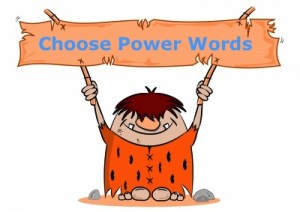“Mark Twain said, ‘The right word is to the nearly right word as lightning is to the lightning bug.’ Fill your book with lightning.” — Robert Littell
It’s our choice to choose the word that gives our sentence the most power in creating a robust image in the reader’s mind. Often, power words don’t naturally pop into our heads.
What? Take the time to think about all 80,000 words in our manuscripts? Good news. You need to deliberate only the verbs, adjectives, and nouns.
From Wimpy to Forceful
Eric gave Elle the paper. I picture Eric extending the paper to Elle and her taking it. And maybe this is enough, if you’re simply getting the paper into Elle’s hand. You intend to call little attention to the action. You want your readers to focus on more important actions or items in your paragraph.
But even in the no-special-attention instance “gave” can be improved. And “paper” can be more specific. How about: Eric handed Elle the letter.
But look at the sentence in the following contexts. You might go through this process armed with a thesaurus/dictionary.
1. Anger. Elle has presented Eric with divorce papers. Eric is incensed.
Gave⇒handed⇒pushed⇒shoved⇒thrust⇒threw⇒flung⇒hurled
Paper⇒pages⇒document⇒divorce papers⇒divorce contract⇒life death sentence
Eric flung the divorce papers at Elle.
2. Joy. Eric presents his first book contract to Elle.
Gave⇒handed⇒waved⇒flapped
Paper⇒document⇒contract⇒book contract
As Eric strode toward Elle, he flapped the book contract. She whisked it from his grasp, examined it, and then danced him around the dining table.
3. Awe. Eric has discovered a Biblical document in a cave.
Gave⇒handed⇒presented⇒laid⇒deposited⇒slid⇒settled⇒rested
Paper⇒document⇒fragment⇒scroll fragment
Eric rested the ancient scroll fragment on Elle’s upturned palms.
I recommend you equip your writing desk with a copy of Flip Dictionary: For when you know what you want to say but can’t think of the word.
Have on⇒put on⇒grace⇒supply⇒equip
Words can stimulate vivid images in your readers’ minds. So choose good ones. Click to tweet.
In the context of jealousy, how would you power-up the example sentence?






 RSS - Posts
RSS - Posts



Good points.
How about:
At her demand, Eric produced his new contract, his new monthly salary glaring at Ellie.
I guess my first reply didn’t post. Thanks for playing Jane. A different twist on the bland sentence.
Good explanation, Zoe. More basic info: Most powerful parts of speech, in descending order: Most verbs of action (not state of being), followed by nouns, followed by adjectives, followed by adverbs. (Power varies greatly within those classifications.) For the most power, put the main idea of a sentence in the verb. In general, words derived from Anglo-Saxon are more powerful than those derived from the Latin. The skilled writer can vary the directness of his reader’s experience by using Latin-derived words (absence, felicity, etc.) to increase the reader’s “distance” from the action and using blunt, Anglo-Saxon-derived words (harsh, slick) to bring him close to the action. In general, monosyllables are more powerful than polysyllables. (My Introduction to Poetry Writing course in one paragraph.)
Ooh, Donn, I hope readers read your comment. I’m going to go back over the scene I just finished and see how I used Anglo-Saxon versus Latin words. Thanks for taking the time to share your one-paragraph intro to Poetry Writing, Donn.